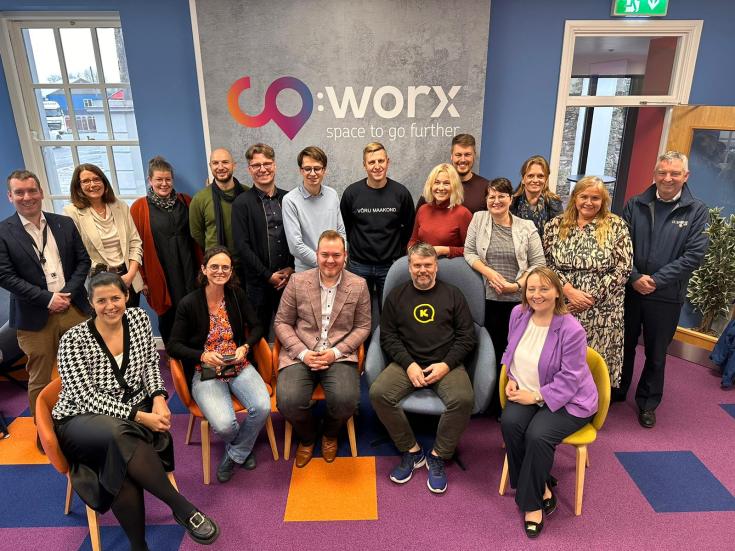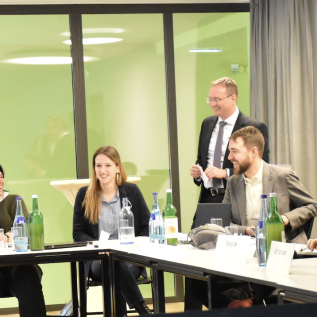Improve regional branding for attracting tech-savvy visitors: key learnings

The Policy Learning Platform organised a peer review for the Põlva County Development Centre, Estonia. The peer review was held in Carrick-On-Shannon, Leitrim County, Ireland on the 17th and 18th of October 2023.
The Põlva County Development Centre was looking for inspiration to improve their regional branding for attracting tech-savvy visitors and for (re)designing community-based services.Three questions were addressed by the peers.
Current state of affairs
The Põlva County Development Centre embarked on the peer review journey to learn from the experience of other European regions and to enhance the Põlva county action plan as well as provide inspiration to the development plans of neighbouring counties Võru and Valga, both of which were also represented at the peer review.
The three counties also have a joint Southeast Estonia PR plan which will go under renewal soon. Finally, the Estonian delegation was also looking for inspiration for the day-to-day activities of their remote working Kupland network.
Peers from across Europe
Alongside Rene Tõnnisson, Mart Veliste, and Elena Ferrario from the Policy Learning Platform, excellent peers participated in the peer review:
- Eeva Arpala, Leader Aisapari programme, Finland
- Femke van Akker, Province of Fryslan, the Netherlands
- Stephen Carolan, Western Development Commission, Ireland
- Pauline Leonard, Western Development Commission, Ireland
- Rebecca Farrell, Leitrim County Council, Ireland
In addition to the people listed, the Western Development Commission and Leitrim County Council were extremely active and highly involved with a large delegation of staff members to provide knowledge and support to the Estonian colleagues. Other local stakeholders were also present, from organisations such as the Cavan County Council, the Longford County Council, Leitrim’s Local Enterprise Office, and the Mohill Entreprise Centre.
The peers shared their experience and provided tailored policy recommendations for ways of tackling our beneficiary’s policy challenges.
They provided the host with valuable insights, know-how, and practical suggestions for solving the challenges presented above.
One of our peers, Femke van Akker, shared the following.

It was great to be part of the peer review. I learned a lot and had good talks during the meeting and also afterwards. I could further help the Irish colleagues with some questions they sent by e-mail.
Some recommendations
- One of the main reasons for organising this peer review as a study visit to Ireland was to learn about the National Hub Network. A key insight was that the now national network with nearly 400 hubs began just as a local pilot project in 2018 with just four hubs. The enlargement step started with a thorough mapping. The same should be done in Estonia – to map all coworking and remote working hubs in all of Estonia. Furthermore, it is important to map the governance structure on the topic and bring all relevant national and local stakeholders around one table.
- In terms of regional branding, two additional target groups were identified by the peers. First, a recommendation was made to launch a dedicated campaign to invite the Southeast Estonia diaspora (national and international) to visit and work remotely for a while or relocate to the region. Secondly, besides attracting individual remote workers, the region should engage more with employers and corporates. Different practical examples on how to do this were shared by the peers.
- The peer review also discussed how a region can welcome newcomers. The peers emphasized the need to be inclusive in public communication – to ensure that information regarding events and services is easy to find and clear for newcomers (in English and with sufficient detail). A concrete example from Finland was the use of so-called “Village Hosts” – local volunteers who are the first contact point for any questions newcomers might have. To encourage relocation to the region, it is also essential to have clear guidelines regarding moving to the region.
Site visits
The peer review also offered a chance to visit local coworking and enterprise hubs to hear and see how day to day activities are carried out. The delegation was warmly welcomed at The Hive Enterprise Centre, The Food Hub, and CO:WORX.
Follow-up report
Explore the challenges and recommendations in the follow-up report below.
Peer review follow-up report - Põlva County Development Center Dec 2023

Peer review publication
Find more information on the methodology and experiences of previous beneficiaries in our publication.

Apply for a peer review
Start your peer review application process today and find solutions to your policy challenge with our expert and peers!

